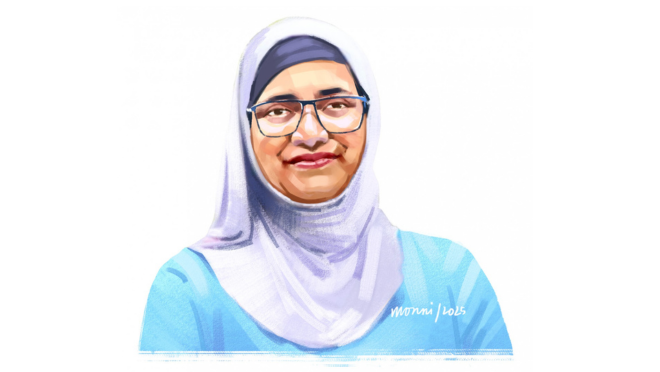Farzana Faruk Jhumu: Meet the first Bangladeshi climate change youth adviser to UN
Farzana Faruk Jhumu: Meet the first Bangladeshi climate change youth adviser to UN

In 2018, Farzana Faruk Jhumu felt that she should give something back to society. Along with a few friends, she started ‘Kathpencil’, with the aim of working for children’s rights.
“We set up a school called Kathpencil Pathshala in a slum in Mirpur. While working with the children there, I realised that many of them were directly affected by climate change,” she said.
That led Farzana to discover the ‘Fridays For Future’ platform, and join their Bangladesh chapter. There, she coordinated the MAPA (Most Affected People and Areas) programme.
This is where it all began.
Farzana was recently named a member of the United Nations’ third youth advisory group on climate change.
“My activism did not actually start with a desire to be an activist. I simply knew that there was a problem and I wanted to be part of the solution,” she noted.
The UN Secretary-General has several advisory groups that help him shape his agenda and set goals. The agendas of different UN bodies are also determined based on the advisory groups’ recommendations.
Since the global climate movement is largely driven by young people, the UN decided to form a youth group in 2020. Its main purpose is to align the UN’s agenda with the global climate movement. This is the third cohort; each cohort serves for about one and a half to two years. In the previous two cohorts, there were seven youth advisers each, but this time, there are 14 including Farzana, who is the first person from Bangladesh.
“I was mentally prepared, yet the huge flow of good wishes and congratulations has left me both inspired and overwhelmed. I feel very proud, as this gives me the opportunity to represent my country — and even the whole South Asian region — on a global stage like the UN. At the same time, I see it as a huge responsibility,” Farzana shared.
The UN Climate Action team collects nominations from climate organisations around the world, based on which, they review and shortlist the final list of members. There is no option to apply directly.
Farzana graduated in Computer Science and Engineering (CSE) from the Military Institute of Science and Technology (MIST) in 2021. She later completed her master’s in Climate Change and Development at Independent University, Bangladesh (IUB).
Currently, Farzana is working on a programme called the ‘People’s Climate Diplomacy Program’. The initiative equips young climate advocates with the tools, training, and support they need to engage meaningfully in global climate negotiations.
From 2022 to 2024, Farzana also worked at UNICEF for two years as a Youth Advocate. During that time, she contributed to a report titled ‘Children’s Climate Risk Index’. The report found that nearly 10 million children in Bangladesh are directly affected by climate change, and Bangladesh ranks among the top 10 countries in terms of children’s climate vulnerability.
“For them, climate change is not a fancy term — it is a harsh reality. However, I see Bangladesh and its fight with climate change from a different angle as well. When it comes to climate adaptation, Bangladesh is truly a world champion, because we have no other option. The impacts are felt constantly across the country, so people have adopted a climate-resilient alternative lifestyle. I believe countries in the Global North can learn a lot from us,” she noted.
This year, COP-30 is scheduled to be held in Belém, Brazil, from 10 to 21 November. Farzana has had the opportunity to participate in four COPs so far. She expects ‘just transition’ to be a major focus at this year’s COP.
“We from the civil society [official constituencies under UNFCCC] have proposed a mechanism to operationalise just transitions and some of the governments have already agreed to propose the mechanism. So, I expect just transition to gain prominence at this COP,” she said.
Since 2025 is a reporting year for Nationally Determined Contributions (NDCs), Farzana believes it will also get attention at this year’s COP.
The July Uprising gave Bangladesh an opportunity for reconstruction. Many things in the environment and climate sector had previously been stalled due to political and geopolitical interests. With a non-political government, expectations for a vital sector like climate were even higher. Yet, Farzana feels that most of those expectations have remained unfulfilled.
“The government should pay greater attention to this sector because climate is not a single issue; it amplifies many other issues. Child marriage, health, education — everything is directly or indirectly linked to it,” she said.
“Any current or future government should recognise that our country has a significant pool of climate-conscious youth. Now is the time for the government to plan how to engage them effectively in tackling this crisis.”
The climate crisis is considered one of the biggest global existential crises of this century. Farzana believes there are many opportunities for young people to play a role in addressing it.
“I see many young people entering the climate sector with hope for meaningful change and it makes me feel very optimistic. When a large number of young people stand together on one platform and engage in activism, it goes beyond just activism; it becomes about entrusting responsibility and leadership to the youth,” she concluded.


